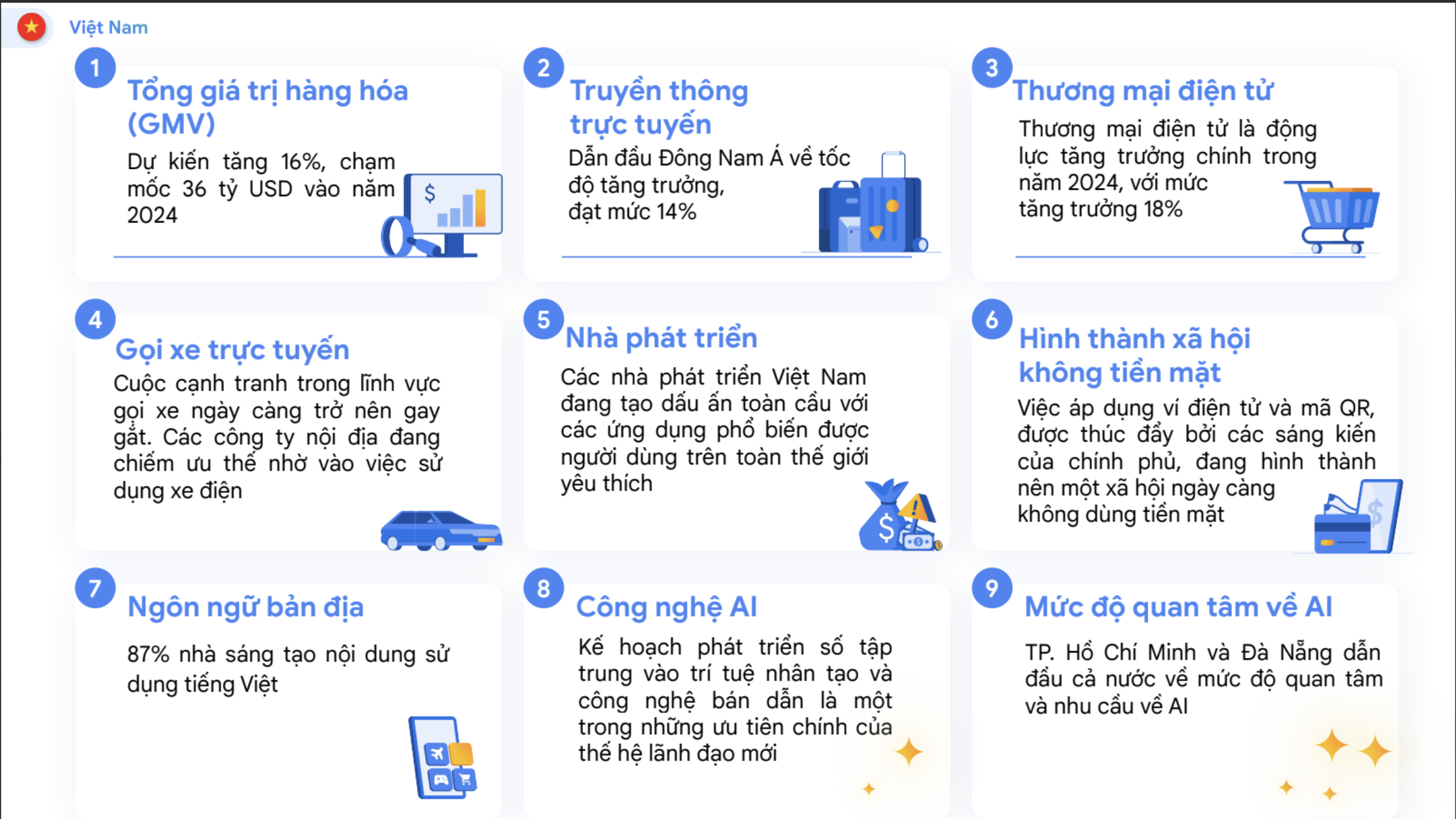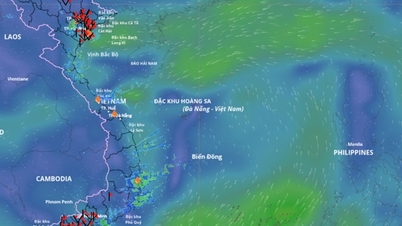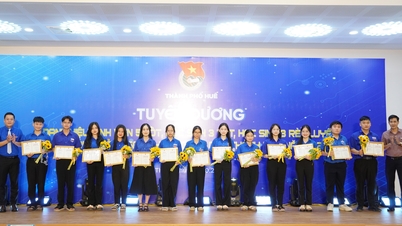The report updates digital economic trends in six Southeast Asian countries including Indonesia, Malaysia, Philippines, Singapore, Thailand, and Vietnam; across six sectors: e-commerce, food delivery services, transportation, online travel, online media, and financial services.
Leading Southeast Asia in media growth
Vietnam's gross merchandise value (GMV) is expected to increase at a 16% compound annual growth rate (CAGR), reaching US$36 billion in 2024.
E-commerce is the main driver of Vietnam’s digital economy growth in 2024 (18% CAGR), followed by online travel (16% CAGR). Vietnam leads Southeast Asia in online media growth, reaching 14% CAGR.
Southeast Asia’s digital economy is thriving, driven by solid macroeconomic fundamentals, growing consumer demand and technological advancements. Despite global challenges, the region’s economy remains resilient, with strong GDP growth and subdued inflation.
The digital economy is the main driver of this growth, with gross merchandise value (GMV), revenue and profits increasing consistently over the past two years, the report said.

By 2024, the regional digital economy is expected to reach US$263 billion in gross merchandise value (GMV), generating US$11 billion in profits, with GMV and profits growing at a compound annual growth rate (CAGR) of 15% and 24%, respectively, from 2023.
For the first time, the report focuses on examining the state of Southeast Asia's digital economy through the lens of profitability.
Key businesses have made significant progress in profitability through tighter commissions, targeted compensation policies, and new revenue streams that have helped drive 2.5x profit growth over the past two years in Southeast Asia.
Strong momentum from e-commerce and online travel
Vietnam's digital economy maintains double-digit growth, driven mainly by e-commerce and online travel.
Vietnam's gross merchandise value (GMV) is expected to grow at a compound annual growth rate (CAGR) of 16% to reach US$36 billion by 2024, with e-commerce and online travel being the main drivers.
In 2024, the e-commerce industry grew 18% year-on-year with GMV reaching 22 billion USD, becoming the main growth driver of Vietnam's digital economy.
In 2023, Vietnamese consumers tend to expand their scope of discovery , with search keywords that do not contain brand names accounting for 68% of total searches, while searches for specific brands account for the remaining 32%.

Brands are reaching audiences by partnering with content creators across a wider range of verticals beyond their core portfolio, and many are even becoming content creators themselves.
Besides e-commerce, Vietnam's online tourism witnessed a 16% year-on-year growth, reaching US$5 billion by 2024, contributing significantly to the gross merchandise value (GMV).
Online travel continues to generate revenue through increased commission rates per flight, while direct retail channels contribute the most to total revenue.
This growth was contributed by the recovery of tourism from visitors in the Asia Pacific region (excluding Southeast Asia), accounting for 52% of total tourism spending in Vietnam.
Meanwhile, Vietnamese people also spend the most on tourism in the Asia Pacific region (excluding Southeast Asia), accounting for more than one-third of total foreign tourism spending by Vietnamese people, equivalent to 36%.
Notably, spending by Vietnamese tourists abroad has grown by 290% since the first half of 2020, with 58% of spending going on shopping.
Vietnam’s online media sector is the fastest growing in Southeast Asia. By 2024, the GMV of Vietnam’s online media industry is on track to reach $6 billion, a compound annual growth rate of 14%, and is expected to reach $11 billion by 2030.
Vietnam is increasingly asserting its position in the game development sector in Southeast Asia, thanks to a large pool of talented developers and a supportive, dynamic ecosystem that contributes to making Vietnam a cradle for innovation in the field of mobile games.
Original video content in Vietnam continues to be the main driver of subscriptions amid fierce competition among streaming platforms.
In addition, this format also promotes the creative economy in Vietnam through the commercial video segment, opening up new revenue sources for content creators.
Notably, fashion and lifestyle content attracts the most creators by consumer base, followed by gaming.

The online ride-hailing market in Vietnam is becoming more competitive with domestic car and electric vehicle (EV) companies.
Vietnam's GMV for the two sectors of transportation and food is expected to reach 4 billion USD (growth of 12%) this year.
Not only that, Vietnam’s ride-hailing sector is undergoing a period of fierce competition with the emergence of domestic car companies and electric vehicles. The increasingly competitive landscape has led to the withdrawal of some companies in the region. As the sector continues to grow, competition is expected to intensify, reshaping the industry and potentially accelerating the encroachment of electric vehicles.
Artificial intelligence is of interest
Interest and demand for artificial intelligence (AI) is leading in urban areas in Vietnam, typically Ho Chi Minh City and Da Nang.
The digital transformation and growth shows that users are increasingly adaptable and ready to adopt new solutions and services. This also drives the interest and demand for AI among digital consumers in Southeast Asia, especially in major cities.
In Vietnam, Ho Chi Minh City and Da Nang lead the country in terms of interest and demand for AI. Education, Marketing and Healthcare are the three industries that generate the most AI searches in Vietnam.

Additionally, AI is also playing a transformative role in the growth of the Creative Economy with the proliferation of accessible and easy-to-use content creation tools and platforms, which has given the creative economy a boost.
Accordingly, in Vietnam, more than 22% of downloads of mobile applications integrate AI features such as photo effects, content creation and video editing.
Recognizing this opportunity, over the past year, the Vietnamese government has announced an ambitious digital roadmap, which emphasizes AI and semiconductor technology along with the goals of economic growth and improved public services.
This proactive approach by the Government facilitates Vietnam to make significant progress in digital technology despite previous limitations in infrastructure investment.
A cashless society is rapidly taking shape in Vietnam, driven by widespread adoption of digital payments and government initiatives. Vietnam is rapidly becoming a cashless society, driven by community initiatives and innovative financial solutions.
The growth of e-wallets coupled with the widespread adoption of QR code payments has significantly reduced cash transactions. Government initiatives have standardised payment systems and enhanced interoperability, further encouraging the shift to cashless usage.
Investors are now prioritizing companies with solid economics, strong market potential, and a clear path to profitability. This shift has led founders to focus on building a sustainable business model from the start.
Affected by the slowdown of the global and regional economy, private capital in Vietnam decreased across all sectors, with only 23 deals recorded in the first half of 2024.
However, 80% of investors expect and express confidence that investment activities in Vietnam will grow in the long term (2025 - 2030), especially in the fields of software & services, digital finance, medical technology and AI.
“Over the past five years, we have witnessed the strong and continuous growth of Vietnam’s digital economy, and 2024 continues to demonstrate that potential,” said Marc Woo, Managing Director, Vietnam, Google Asia Pacific. “Driven by e-commerce, the country’s digital economy has maintained double-digit growth despite the uncertain global economic environment.
In addition, the online media sector in Vietnam has the fastest growth rate in Southeast Asia (14%), and more and more Vietnamese app developers are making a global impact with popular apps for users around the world. Vietnamese users also show great interest in AI in 2024 and it is encouraging that the Vietnamese Government is prioritizing this sector.”
According to Mr. Marc Woo, “Building Vietnam with Google AI” continues to support the growth of Vietnam’s digital economy by helping the local workforce and businesses equip themselves with skills and knowledge to be ready for the AI era.
Dantri.com.vn
Source: https://dantri.com.vn/suc-manh-so/viet-nam-vuon-minh-manh-me-trong-nhieu-linh-vuc-nho-cong-nghe-20241112154853992.htm


![[Photo] Ho Chi Minh City is brilliant with flags and flowers on the eve of the 1st Party Congress, term 2025-2030](https://vphoto.vietnam.vn/thumb/1200x675/vietnam/resource/IMAGE/2025/10/10/1760102923219_ndo_br_thiet-ke-chua-co-ten-43-png.webp)
![[Photo] General Secretary attends the parade to celebrate the 80th anniversary of the founding of the Korean Workers' Party](https://vphoto.vietnam.vn/thumb/1200x675/vietnam/resource/IMAGE/2025/10/11/1760150039564_vna-potal-tong-bi-thu-du-le-duyet-binh-ky-niem-80-nam-thanh-lap-dang-lao-dong-trieu-tien-8331994-jpg.webp)


![[Photo] Opening of the World Cultural Festival in Hanoi](https://vphoto.vietnam.vn/thumb/1200x675/vietnam/resource/IMAGE/2025/10/10/1760113426728_ndo_br_lehoi-khaimac-jpg.webp)


































































































Comment (0)